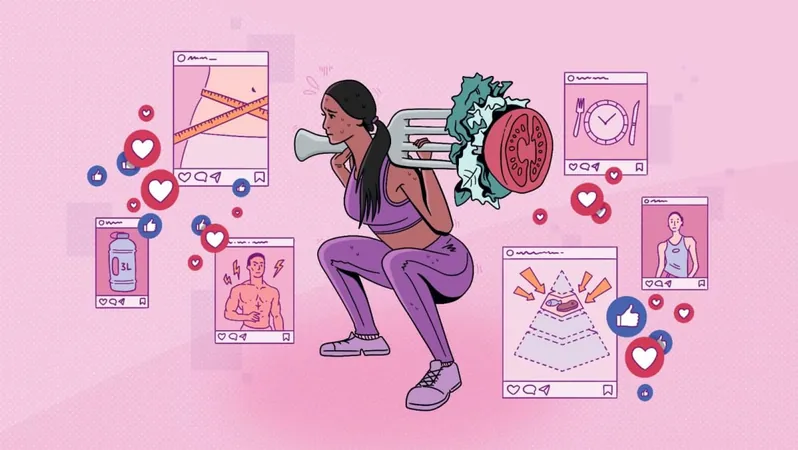
Alarming Rise in Eating Disorders Driven by Fad Diets and Social Media Misguidance
2024-11-22
Author: Daniel
Introduction
Teenager Joy Ng would wake up before dawn, before her family was even awake, to follow exercise videos she found on social media. While this might appear to encourage a healthy lifestyle, Joy was battling anorexia nervosa—a severe eating disorder characterized by an intense fear of gaining weight and a distorted perception of body image.
The Impact of Anorexia
People suffering from anorexia often engage in excessive exercise, severely restrict their food intake, abuse laxatives, or induce vomiting, leading them to dangerously low body weights. At just 19 years old, Miss Ng began her journey towards recovery but recognizes that her struggles began with seemingly innocent intentions during the COVID-19 lockdown in 2020. As a teenager wanting to shed some weight after months of confinement, she started to exercise more and eat less. However, this decision spiraled into an obsession with weight and a toxic mindset surrounding food.
The Role of Social Media
Her fixation led her down a dark path, joining online communities that encouraged unhealthy behaviors, promoting starvation to achieve an unattainably thin body. The growing phenomenon of social media platforms perpetuating distorted beauty standards has been widely acknowledged, yet it’s not only the toxic comparison that drives people into harmful patterns; misleading nutritional advice from influencers plays an equally critical role.
Fad Diets and Nutritional Risks
Nutritionists are sounding the alarm on trendy diets heavily pushed by social media personalities. Many of these diets advocate eliminating entire food groups, which can deprive individuals of essential nutrients. Take, for instance, 56-year-old Francis Cheah's experience with the “carnivore diet,” where he only consumes meat, fish, and eggs. Despite losing a substantial amount of weight—25 kg over the course of a year—health experts warn that restrictive diets can lead to long-term health complications and worsen the risk of developing an eating disorder.
Rising Cases of Eating Disorders
The alarming rise in diagnosed eating disorders is evident, with institutions like KK Women’s and Children’s Hospital reporting an increase in annual cases from around 50 in 2017 to about 140 in 2023, including a concerning rise in cases among children under the age of 13. This is reflective of a broader global trend; studies indicate the prevalence of eating disorders increased from 3.4% to 7.8% between 2000 and 2018.
Societal Pressures and Misinterpretations
Experts cite various factors contributing to this increase, including societal pressures to conform to an idealized body image, especially prevalent among younger individuals. Social media feeds often glamorize extreme dieting and weight loss, igniting unhealthy behavior patterns. Dr. Juliet Tan notes that many mistakenly view eating disorders as mere dieting—a misconception that risks severe physical and mental health consequences, especially in developing children.
Dangerous Trends and Misleading Advice
Moreover, fad diets like “oatzempic” (a concoction of oat water and lime juice) illustrate how misleading advice can perpetuate unrealistic and potentially dangerous expectations about weight loss. Such trends can be deceptively marketed as healthy alternatives while failing to deliver the essential nutrients the body requires.
Psychological Repercussions of Fad Diets
Rapid weight loss diets, often glamorized by influencers, can lead people to restrict their calorie intake drastically, resulting in not only physical but severe psychological repercussions, including body image issues and binge-eating disorders.
The Silver Lining of Social Media
Despite the negativity associated with social media, it can also serve as a source of support for individuals struggling with eating disorders, as seen in Joy’s case. Through her recovery, she discovered advocates promoting a healthier relationship with food, which ultimately helped her overcome some of her struggles.
Navigating Credible Advice
However, social media remains a double-edged sword, with influencers able to push harmful diet trends that can influence impressionable audiences. For instance, the “Liu Yifei diet,” popularized by a Chinese actress, promotes extreme caloric restriction, yielding quick weight loss that can endanger health.
Seeking Professional Guidance
Experts advise individuals navigating weight loss or health goals to discern between credible nutritional advice and harmful content. Key indicators of poor dietary advice include suggestions to eliminate entire food groups or overly aggressive weight loss promises. Instead, seeking guidance from certified nutritionists and health professionals can provide a safer, more balanced approach to health and wellness.
The Call for Digital Literacy
To foster awareness and mitigate the negative impacts of social media, educating users on digital literacy is crucial. By developing critical thinking and understanding the intentions behind promoted trends, users can combat the allure of harmful diets while promoting healthier, sustainable practices.
Conclusion
Joy’s story serves as a testament to the importance of compassion and moderation in discussions surrounding food and body image. By sharing her journey online, she hopes to inspire others to reevaluate their relationship with food and encourage open conversations about mental health and wellness. As her experience highlights, recovery is a challenging and ongoing journey that focuses on reclaiming a healthy and fulfilling life.






 Brasil (PT)
Brasil (PT)
 Canada (EN)
Canada (EN)
 Chile (ES)
Chile (ES)
 España (ES)
España (ES)
 France (FR)
France (FR)
 Hong Kong (EN)
Hong Kong (EN)
 Italia (IT)
Italia (IT)
 日本 (JA)
日本 (JA)
 Magyarország (HU)
Magyarország (HU)
 Norge (NO)
Norge (NO)
 Polska (PL)
Polska (PL)
 Schweiz (DE)
Schweiz (DE)
 Singapore (EN)
Singapore (EN)
 Sverige (SV)
Sverige (SV)
 Suomi (FI)
Suomi (FI)
 Türkiye (TR)
Türkiye (TR)